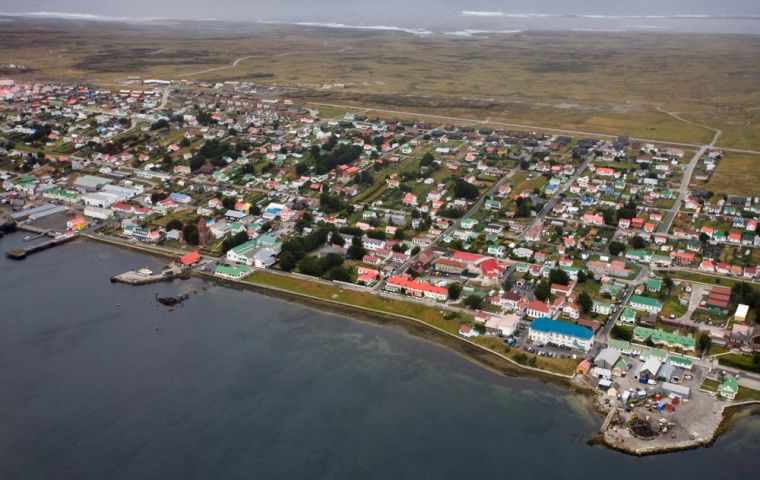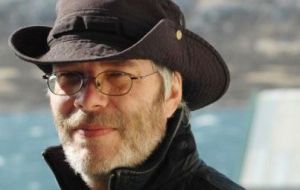MercoPress. South Atlantic News Agency
Aldridges Feltons Smiths and Shorts 175 years old in Falklands and still going strong
 Port Stanley
Port Stanley  Gavin Short, one of eight elected members of the Legislative Assembly of the Islands, which are effectively self-governing.
Gavin Short, one of eight elected members of the Legislative Assembly of the Islands, which are effectively self-governing. By Gavin Short, Elected Member of the Falklands Legislative Assembly (*)<br />
<br />
On Saturday the 13th of October 1849 the 578-ton barque Victory, under the command of Captain Mullens, out of London, England, sailed up Port William. The vessel which was built by Fenwick & Co, Sunderland in 1847 was owned Willis, Gunn and Co (the company advertised as H H Willis and Co) and later owned by Wilson and Cook.
The vessel brought a rather mixed cargo to the Falklands, to quote from the records held by our archives, she arrived with “Pensioners etc. namely 134 men women and children; with a cargo of houses and appurtenances”. The vessel was no stranger to the transport of immigrants, having taken some of the first settlers to Dunedin in New Zealand.
Who were these adventurous souls and why were they here in the Falklands? To answer that we must go back a little way. The decision had been made to move the Capital from Port Louis to what is now known as Stanley (formerly Port Jackson). Work began in Stanley in July 1843 and most of the settlers transferred by late 1844, and it became the Capital in July 1845 and its name was also changed to Stanley in the same year.
The authorities knew that they needed immigrants who were capable of doing some pretty strenuous work in a harsh environment (including having to build their own houses) but also of being able to bear arms should the need arise.
A War Office Memorandum of Conditions on Which it is Proposed to Enrol Pensioners for Service in the Falkland Islands 1849 stated that: A maximum age of candidates should not exceed 45 years and maximum number of children not to exceed 4. Rates of pay at 1 shilling and 3 pence per day for a private, 1 shilling and 10 pence a day for a Sergeant in addition to pension, from the period they left home till embarkation. Conveyance at public expense for themselves and families to port of embarkation, free passage to the Falkland Islands, free food on board and quarter pension in advance.
The memorandum went on to stipulate that the Pensioners would live in “two roomed kit houses worth £50 each” being shipped on the same vessel and in a “large barracks worth £300 capable of containing them with their families immediately on their arrival until the cottages have been put up”.
Further correspondence from the time on the matter added a little more: On arriving in Stanley, the Pensioners would “live in the cottages and be given allotments of 10 acres of land, and with the rights of grazing over an individual quantity of land not to exceed 100 acres”. The men themselves were under the Mutiny Act and Articles of War and were liable at all times to be called out for duty if their services were required.
Later in July 1850, after the families had arrived, the secretary of state Lord Grey told the Governor: “The object of sending out these immigrants was to supply the Colony with a body of men, who would be capable of using arms in case of emergency, and who would, at the same time be able to live by their own industry … in sending out this handful of men, the object is not to form a fortified post, but merely to obtain the presence of a few steady and loyal subjects trained to arms, who could suppress any sudden tumult or repel any insult from any wandering vessel”.
In charge of the new immigrants was Captain James Reid, complete with his family, and was assisted by Sergeant-Major Henry Felton. A letter from Governor George Rennie dated 2nd November 1849 to Surgeon Superintendent EW Day of Victory reads “I have directed Captain Reid, in the event of weather permitting, to have the whole party landed this afternoon”. Thus began the Pensioners’ sojourn in the Falkland Islands.
The whole entourage were housed in the Barracks which can be seen to this day and it was at the time said to consist of just three rooms so one can presume that living conditions whilst they were constructing the kit houses must have been pretty grim and there was probably the odd squabble or two between the new arrivals.
The houses that they constructed and lived in can still be seen on Pioneer Row and Drury Street.
The settlers themselves signed up for a seven-year contract which would end in July 1856, and after that they were free to go elsewhere, or stay if they wished.
What brought these families south? My guess is that many, just like in other parts of the world, were escaping poverty and looking to build a better life for themselves and their families. In the case of the original Short it does seem an odd choice for someone who was invalided out of the military because he suffered from “chronic rheumatism, the effects of climate and military service” so I can only surmise that he was either trying to get away from a grim situation in his country or thought we were some sort of tropical paradise.
Many families found life down here in the Falklands not to their liking and in 1853 thirteen of them signed a petition to be transferred to Tasmania, Australia or New Zealand, there being “much discontent prevailing amongst them”. According to a report by Governor Moore in 1857, of the original detachment of 30 Pensioners, seven had died, eleven were released from their engagement and had already left the Islands, and five wished to remain as colonists. The remaining seven left in 1858.
Those who stayed were the Dowers, Shorts, Smiths, Feltons and Hawkins (commonly spelt Hocking) and their descendants are still in the Islands.
Of the 30 surnames that appear on the list of those who chose to head south in 1849 only three remain in use here in the Falklands 175 years later and they are: Felton, Smith and Short. However as often is the case here in the Falklands, there is a slight twist, as there was another surname not listed among those that arrived on the Victory. John Short met and married Sarah Aldridge on the 30th of July 1837 whilst he was stationed in Jamaica. Sarah was a widow and had a son Thomas Aldridge from her first marriage and I believe that the Aldridge’s that live in the Falklands today are the direct descendants of Thomas Aldridge so should rightly take their place in celebrating their 175th anniversary of living in the Falklands.
If you meet any Short here in the Falklands, we are all related having descended from John and Sarah. The old boy himself went out with a bit of a bang as is documented by our splendid Jane Cameron National Archives: John, age 59 years & 11 months and a pensioner of the 8th Regiment of Kingstown, died 14 March 1866 from a rupture of the intestine caused by the accidental bursting of a steel and was buried 18 March 1866 in Grave D317. He had been attempting to extract gunpowder from a shell at Fairy Cove which exploded.
The fate of the barque Victory that brought us immigrants to the Falklands all those years ago is shrouded in mystery. Johnnie Walker Whiskey used to have the marketing slogan “Johnnie Walker: Born 1820, still going strong” – well, the Aldridges, Feltons, Smiths and Shorts may have arrived a little after Johnnie Walker, but like a good whiskey we have all aged well and like that whiskey, we are “still going strong” 175 years later.
(*) The article in its English and Spanish version was provided by the Falklands elected legislator at the request of the Argentine agency Infogate.




Top Comments
Disclaimer & comment rules-

Read all commentsinteresting to see the irish spelling of that wonderful golden drink for a scottish whisky product (no “e”)! celtic neighbours perhaps? as an aside johnnie walker got his square face long before young jack daniels!
Oct 15th, 2024 - 12:25 pm 0Commenting for this story is now closed.
If you have a Facebook account, become a fan and comment on our Facebook Page!